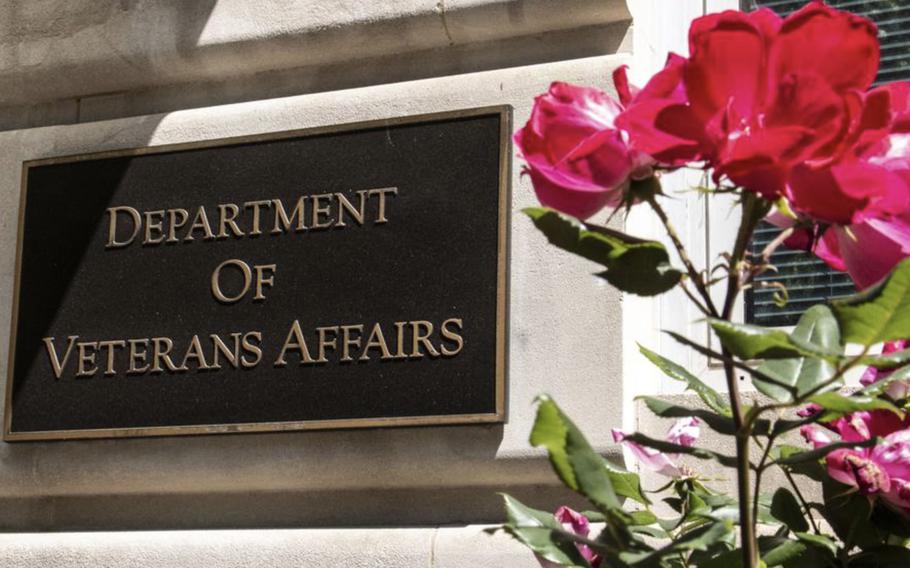
The Senate will need to vote by Friday to cover a $3 billion shortfall in the fiscal 2024 Department of Veterans Affairs budget. The vote is to avoid a potential disruption of veterans’ benefits that includes disability benefits and retirement pensions. The House passed an emergency appropriations measure Tuesday. (Stars and Stripes)
WASHINGTON — Senators on Wednesday grilled leaders from the Department of Veterans Affairs on why they were given just six weeks’ notice of a nearly $3 billion gap in the agency’s budget that potentially could prevent some veterans from receiving their benefits.
“This is unacceptable that veterans’ benefits are at risk and that the VA did not properly plan for this influx of claims,” Sen. Maggie Hassan, D-N.H., said.
Sen. Dan Sullivan, R-Alaska, asked why VA Secretary Denis McDonough was not present at the Senate Veterans’ Affairs Committee hearing to answer questions, given the seriousness of the budget shortfall.
“This is a failure on leadership. I’m disappointed the secretary wasn’t here. When something of this magnitude happens, it’s incumbent upon him to be here,” Sullivan said.
The Senate will need to vote to cover the shortfall by Friday to avoid a potential disruption of veterans’ benefits.
VA leaders in July disclosed a $3 billion budget shortfall for fiscal 2024, which ends Sept. 30, and a projected $12 billion shortfall for fiscal 2025.
The House on Tuesday passed the Veterans Benefits Continuity and Accountability Act, sponsored by Rep. Mike Garcia, R-Calif., that will enable the VA to cover immediate payments for 7 million veterans. Passage, by voice vote, sent the legislation to the Senate to vote on emergency funding that will allow the VA to deliver the monthly payments on time to veterans.
If the measure fails to pass, beneficiaries could wait days or weeks to receive compensation that was supposed to be sent Oct. 1, the VA said.
“Today, we will discuss an urgent matter — providing additional funding to the Veterans Benefits Administration so it can deliver benefits payments to veterans and their families on time,” said Sen. Jon Tester, D-Mont., chairman of the committee.
No action was taken at the hearing.
But lawmakers had the opportunity to air their concerns about the shortfall and ask questions of VA leaders about budget management, the reasons for the shortfall and why Congress did not know about it sooner.
Sen. Jerry Moran of Kansas, the top Republican on the committee, wanted to know why the VA waited until July to inform lawmakers about the shortfall, after learning about it at least a month earlier.
Joshua Jacobs, the VA undersecretary for benefits, said the VA first had to validate whether its updated forecast was correct before disclosing the information to Congress.
He said the VA was on track in the spring to meet its own budget projections but learned in June that it had underestimated a surge in demand for veterans’ benefits driven by the Sergeant First Class Heath Robinson Honoring our Promise to Address Comprehensive Toxics Act, or PACT Act. The two-year-old law expanded benefits to veterans exposed to burn pits and other toxic materials during military service.
None of the money that the VA needs to meet its 2024 budget covers administrative costs, Jacobs said. The $3 billion represents a week’s worth of payments to veterans receiving disability compensation and retirement pensions, he said.
“It is entirely for supporting care and benefits,” Jacobs said. “This is money that goes directly into the pockets of veterans and their survivors.”
About 98% of monthly compensation for disability and pension payments are delivered by direct deposit to veterans. Jacobs said the VA is working closely with the Department of Treasury to ensure those funds go out as soon as Congress provides the additional revenue.
But there are roughly 140,000 veterans who receive their compensation by check. This group of “vulnerable” veterans is largely elderly with many living in rural and remote areas, Jacobs said. They could face delays of two weeks if Congress does not act quickly to cover the shortfall, he said.
Hassan expressed concern for veterans who depend on the monthly payments to meet basic needs and asked what the VA is doing to ensure that it accurately projects its level of resources and capacity to provide benefits to veterans in the future.
“The veterans now covered through the PACT Act are going to receive care through the VA for decades to come,” she said.
Shereef Elnahal, the VA undersecretary for health, said the VA was working to improve its models for forecasting the demand for health care and other benefits.
“We should have been more communicative. The main driver is that we are delivering more care,” he said. “We worked to validate the [budget forecast] and communicate the risk to Congress.”
Sen. Angus King, I-Maine, said the upper chamber needed to vote swiftly.
“I hope that the Senate will join me in acting quickly to ensure that we deliver these resources, hopefully within the next 24 hours, to avoid negative impacts as well as the anxiety that’s out there today on the veterans, our veterans and their beneficiaries,” he said.